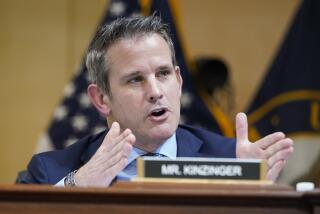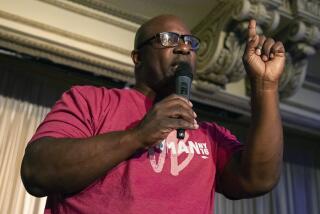Iowa Showing Prompts Gramm to Quit Race
- Share via
MANCHESTER, N.H. — The impact of Monday night’s Iowa caucus voting rumbled through the Republican landscape Tuesday, forcing Sen. Phil Gramm of Texas to decide to quit the race while energizing the campaign of Patrick J. Buchanan and attracting prominent new support to former Tennessee Gov. Lamar Alexander.
Gramm appeared briefly at an event in Concord, N.H., Tuesday morning, then abruptly left the state for meetings with his advisors, who reportedly considered hanging on at least through South Carolina’s primary March 2. But late in the day, Gramm began calling supporters to tell them that he was abandoning his once-promising presidential quest. He scheduled an official announcement for today in Washington.
As Gramm called it quits, Buchanan, the man who was largely responsible for driving him from the race, proclaimed his intention to remake the GOP in his own conservative populist image--presaging a brutal fight over the next days and weeks for the party’s presidential nomination.
Sen. Bob Dole of Kansas, who came in first in Iowa, 3 points ahead of Buchanan, did his best to remain above the fray--sticking to a front-runner’s strategy despite his close call Monday night.
And Alexander, who came in third in Iowa behind Buchanan and Dole, picked up the support of former Education Secretary William J. Bennett, whose endorsement was eagerly sought by several campaigns. Bennett, who has strong support among social conservatives who have expressed doubts about Alexander, plans to campaign with the former Tennessee governor here today.
Tuesday, however, most of the attention was focused on Buchanan, who, in a characteristically assertive statement, declared to reporters that his campaign is succeeding in “moving the national debate in the direction in which we are determined to take America.”
Citing support by other Republican candidates for proposals, from tax reform to term limits, on which he claimed to have led the way, Buchanan declared that “the Republican Party is becoming a Buchanan party.”
“That’s why we think we ought to be the one to lead it.”
Almost forgotten for the day was publishing magnate Steve Forbes, who suffered an expensive disappointment with a fourth-place finish in Iowa and spent the day at his headquarters in Bedminster, N.J.
Campaign sources said Forbes planned to reorient his ads more positively after indications that his sharply negative strategy had alienated a large number of voters.
Alexander’s strategists hope to steal considerable support that had been going to Forbes and stay in the running against Dole and Buchanan by stressing their candidate’s “outsider” credentials. They, and strategists for other campaigns as well, believe Forbes’ outsider image--more than the specifics of his signature flat-tax proposal--accounted for much of the support he had received here.
At a morning press conference alongside the Merrimack River in Concord, Alexander pointed out to an audience of supporters and reporters that Dole had chosen to speak to the state Legislature at the gold-domed Capitol building in the distance, while he was taking his own campaign to “America outside Washington.”
“This race will come down to Bob Dole and me. He’s from Washington, I’m from outside Washington. He’s from one generation, I’m from another,” Alexander, 55, said of Dole, 72.
As for Buchanan, Alexander sought to draw a sharp line on an issue that Buchanan has made a key theme: foreign trade. “America is not going to elect a protectionist president,” Alexander said.
Asked about the endorsement plans, an advisor to Bennett said that “he feels it is time. It looks like the field is narrowing.”
“He thinks Lamar is best qualified, best able to beat Bill Clinton and most capable to govern. He thinks Lamar will be amenable to the best and boldest conservative ideas.” Alexander has recently expressed support for shifting greater authority for social welfare programs from government to private charities, an idea Bennett has also been promoting.
Bennett and Alexander worked together at the think tank Empower America, whose former board chairman is Forbes.
While his rivals retooled their campaigns, Dole, whose once seemingly firm grip on the nomination appeared to have been shaken by his narrow win in Iowa, nevertheless seemed content to stick to the themes that have carried his candidacy for nearly a year. In his address to the Legislature in Concord he touched on such standbys of his campaign rhetoric as the moral erosion of America, the need to divert power from the federal government to the states and his days as a World War II infantry officer.
“We have drifted for far too long away from the values and philosophy that shaped America,” Dole said. “I believe that the choice we make this year . . . will determine the character of our nation and the future for our children long into the next century.”
Dole earned an enthusiastic reception from the lawmakers. But he appeared visibly tired, and his speech surprised some in the audience, as he abruptly stopped talking and sat down after declaring, “I’ve often thought that if I’m elected president of the United States, I will decide when troops are sent, not [U.N. Secretary General] Boutros Boutros-Ghali.”
Far more aggressive was Buchanan. Declaring himself the “one and only true conservative who can win the nomination,” he urged conservatives to rally behind his banner.
But he sought to reach beyond the forces of the right, to backers of Ross Perot and former Democrats.
“I want to make the Republican Party a great coalition,” he said, one that would be built around defending a variety of groups, ranging from the unborn, threatened by abortion, to “working men and women of this country whose jobs are threatened by unfair trade deals done for the benefit of huge corporations.”
Times staff writers Ronald Brownstein, Gebe Martinez and Bob Sipchen contributed to this story.
* RELATED STORIES: A5, A12
More to Read
Get the L.A. Times Politics newsletter
Deeply reported insights into legislation, politics and policy from Sacramento, Washington and beyond. In your inbox twice per week.
You may occasionally receive promotional content from the Los Angeles Times.










